- Clone
- R1.302 (See other available formats)
- Regulatory Status
- RUO
- Other Names
- Poliovirus Receptor Related 1 Protein (PRR1), Nectin-1, HveC
- Isotype
- Mouse IgG1, κ
- Ave. Rating
- Submit a Review
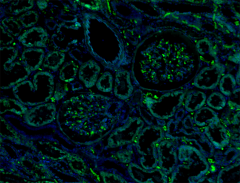
| Cat # | Size | Price | Quantity Check Availability | Save | ||
|---|---|---|---|---|---|---|
| 340402 | 100 µg | $323 | ||||
CD111, known as poliovirus receptor related 1 protein (PRR1), Nectin-1 and HveC, is a 75 kD type I transmembrane glycoprotein. A member of the nectin family and Ig gene superfamily, CD111 is broadly expressed on endothelial cells, epithelial cells, neuronal cells, megakaryocytes, and CD34-positive stem cells. CD111 functions as one of the herpes simplex virus 1 (HSV-1) and HSV-2 receptors and is an adhesion molecule involved in the formation of cell junctions.
Product DetailsProduct Details
- Verified Reactivity
- Human
- Antibody Type
- Monoclonal
- Host Species
- Mouse
- Immunogen
- Human Nectin-1 transfected NIH/3T3 cells
- Formulation
- Phosphate-buffered solution, pH 7.2, containing 0.09% sodium azide.
- Preparation
- The antibody was purified by affinity chromatography.
- Concentration
- 0.5 mg/ml
- Storage & Handling
- The antibody solution should be stored undiluted between 2°C and 8°C.
- Application
-
FC - Quality tested
IHC-P - Verified
WB, IP - Reported in the literature, not verified in house - Recommended Usage
-
Each lot of this antibody is quality control tested by immunofluorescent staining with flow cytometric analysis. For flow cytometric staining, the suggested use of this reagent is ≤1.0 µg per million cells in 100 µl volume. For immunohistochemical staining on formalin-fixed paraffin-embedded tissue sections, the suggested use of this reagent is 5.0 - 10.0 µg per ml. It is recommended that the reagent be titrated for optimal performance for each application.
- Application Notes
-
Additional reported applications (for relevant formats) include: immunoprecipitation, Western blot, immunohistochemical staining of frozen tissue sections, block HSV-1 and HSV-2 entry into cells.
-
Application References
(PubMed link indicates BioLegend citation) -
- Cocchi F, et al. 1998. Proc. Natl. Acad. Sci. USA. 95:15700.
- Martinez WM and Spear PG. 2002. J. Virol. 76:7255.
- Reymond N,et al. 2004. J. Exp Med. 199:1331.
- RRID
-
AB_2284683 (BioLegend Cat. No. 340402)
Antigen Details
- Structure
- 75 kD type I transmembrane glycoprotein, Nectin family, Ig superfamily
- Distribution
-
Myelomonocytic cells, megakaryocytes, CD34-positive stem cells, endothelial cells, epithelial cells, and neuronal cells.
- Function
- Adhesion, receptor for Herpes simplex Virus 1 (HSV-1) and HSV-2
- Ligand/Receptor
- Nectin-1, -2, -3, and -4, CD155, HSV-1 and HSV-2
- Cell Type
- Endothelial cells, Epithelial cells, Hematopoietic stem and progenitors, Megakaryocytes
- Biology Area
- Cell Biology, Immunology, Neuroscience, Synaptic Biology
- Molecular Family
- Adhesion Molecules, CD Molecules
- Antigen References
-
1. Zola h, et al. 2007. Leukocyte and Stromal Cell Molecules:The CD Markers. Wiely-Liss A John Wiley & Sons Inc, Publication.
2. Simpson SA, et al. 2005. J. Neuroviral. 11:208.
3. Akhtar J, et al. 2008. Ophthalmol. Vis. Sci. 49:4026. - Gene ID
- 5818 View all products for this Gene ID
- UniProt
- View information about CD111 on UniProt.org
Related Pages & Pathways
Pages
Related FAQs
Other Formats
View All CD111 Reagents Request Custom Conjugation| Description | Clone | Applications |
|---|---|---|
| Purified anti-human CD111 (Nectin-1) | R1.302 | FC,IHC-P,IP,WB |
| PE anti-human CD111 (Nectin-1) | R1.302 | FC |
Customers Also Purchased
Compare Data Across All Formats
This data display is provided for general comparisons between formats.
Your actual data may vary due to variations in samples, target cells, instruments and their settings, staining conditions, and other factors.
If you need assistance with selecting the best format contact our expert technical support team.
-
Purified anti-human CD111 (Nectin-1)
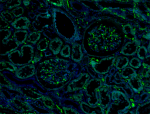
Human paraffin embedded kidney tissue was stained with purif... -
PE anti-human CD111 (Nectin-1)
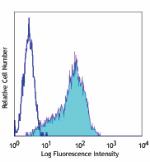
Human erythroleukemia cell line TF-1 stained with R1.302 PE

 Login/Register
Login/Register 







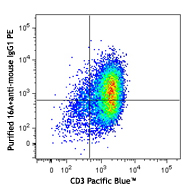

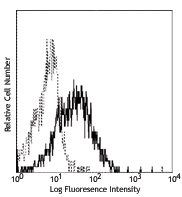







Follow Us